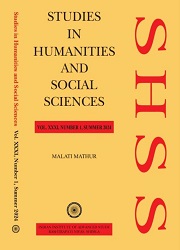RETRACTED ARTICLE: Waris Shah's Heer:Subversion and Radicality in the Qissa and Postcolonial Punjabi Poetry
RETRACTED NOTES: Significant similarities were noticed post-publication , indicating that it has been plagiarised.
Keywords:
Qissa, epicAbstract
RETRACTED NOTES: Significant similarities were noticed post-publication , indicating that it has been plagiarised.
Downloads
Download data is not yet available.
Published
2023-06-19 — Updated on 2024-05-13
How to Cite
Narang, S. . (2024). RETRACTED ARTICLE: Waris Shah’s Heer:Subversion and Radicality in the Qissa and Postcolonial Punjabi Poetry: RETRACTED NOTES: Significant similarities were noticed post-publication , indicating that it has been plagiarised. Studies in Humanities and Social Sciences (SH&Amp;SS), 29(1), 49–68. Retrieved from http://14.139.58.200/ojs/index.php/shss/article/view/1441
Issue
Section
Articles



